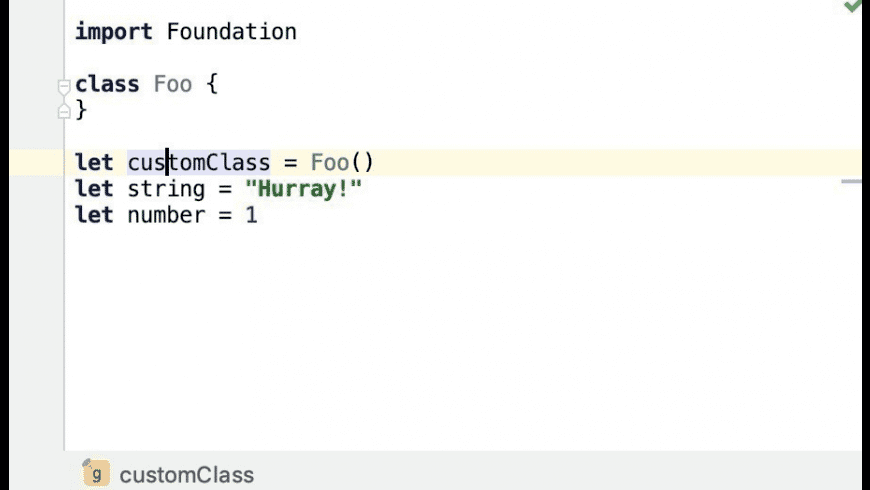AppCode vs Xcode: What are the differences? Developers describe AppCode as 'IDE for iOS/macOS development'. It is an integrated development environment for Swift, Objective-C, C, C, and JavaScript development built on JetBrains’ IntelliJ IDEA platform. It takes care of your routine tasks and saves you from extra typing. Download appcode for free. Get project updates, sponsored content from our select partners, and more.
Intelligent development
environment
Thanks to an in-depth understanding of your code structure, AppCode takes care of your routine tasks and saves you from extra typing.
Efficient project navigation
Jump to any file, class, or symbol in your project in no time, use hierarchical and structure views to navigate through your project structure.
Smart completion
AppCode offers two kinds of code completion: basic as-you-type completion, and more advanced SmartType completion for precise filtering of suggestions.
Reliable refactorings
Modify and improve your code any time with safe, accurate and reliable refactorings.
Thorough code analysis
AppCode is constantly monitoring the quality of your code. It warns you of errors and smells and suggests quick-fixes to resolve them automatically.
AppCode provides lots of code inspections for Objective-C, Swift, C/C++, and a number of code inspections for other supported languages. All code inspections are run on the fly.
Productive
unit testing
Out of the box, AppCode supports XCTest, Quick, Kiwi, Catch, Boost.Test, and Google Test testing frameworks. Code generation action to get unit tests’ methods makes you more productive. Use ⌘N to get test methods according to the context.
Many languages, one IDE
AppCode natively supports Objective-C, Swift, C and C++ (including modern C++ standards, libc++ and Boost), as well as JavaScript, XML, HTML, CSS and XPath.
Rename refactoring
Rename variables, constants, functions, type names and classes and rest assured that AppCode will update all the usages across the entire code base for you.
Override/Implement
Cut down on the routine when implementing or overriding methods - AppCode creates a stub with some default code for you.
Create from usage

Have you ever dreamed of creating a function, constant, variable or property declaration just by using it in your code? Simply press ⌥⏎ and have it created automatically in the right place!
The complete
experience
AppCode is 100% compatible and interoperable with Xcode, with no additional configuration required, and seamlessly integrates with CocoaPods, Reveal application, most popular version control systems and a number of issue trackers.
Swift Support
AppCode 2020.3 supports multiple trailing closure syntax, multi-pattern catch clauses, and other recent Swift 5.3 changes.
SourceKit-based Go to Declaration
Use Go to Declaration in Swift even before indexing and caching are finished.
Swift Localization
Easily localize strings in Swift thanks to new intentions, and use completion and navigation for localization keys.
AppCode is a constant for me. There are a lot of things that it does much better than Xcode that save me a lot of time programming. It’s Awesome.
Anyone who’s not using AppCode is wasting precious time every day. I save hours every week, and feel impeded whenever I'm editing Objective-C outside of AppCode.
For me this is the best thing about AppCode – ability to quickly change and generate code.
The only iOS/macOS IDE where refactoring actually works.
With AppCode, it feels like code flies from my head to the screen.
AppCode is fantastic! Not only is it more stable than Xcode, but it provides the familiar power and efficiency that I've grown accustomed to with JetBrains products.
Join Our Customers Worldwide
| Developer(s) | JetBrains |
|---|---|
| Stable release | 2020.3.4 (Build 203.7717.57) / 16 March 2021; 29 days ago[1] |
| Operating system | macOS |
| Type | IDE |
| License | Trialware |
| Website | jetbrains.com/objc |
Appcode Eap
AppCode is an integrated development environment (IDE) for Swift, Objective-C,[2][3]C, and C++[4][5] development built on JetBrains’ IntelliJ IDEA platform. The first public preview version of AppCode became available in April 2011. The latest stable release is shown next to Stable release and is available at JetBrains’ official web site. AppCode is built on IntelliJ IDEA platform, which is written in Java and Kotlin. Users can extend its abilities by installing plug-ins created for IntelliJ Platform, as well as they can write their own plug-ins.[6]
Key features[edit]
- Coding assistance with code completion, code generation options, live templates, code formatting, multiple carets and selections, automatic insert of imports and imports optimization.
- Code analysis with syntax and error highlighting, and quick-fixes.[7]
- Project and code navigation: special project views, file structure views, and quick jumping between files, classes, methods and usages, navigation through class hierarchy, and usages search.
- Refactorings including Rename, Introduce Variable, Extract Parameter/Method/Block Parameter, Change Signature, Move, etc.[8]
- iOS development: run/debug on device, iOS simulator.[9]
- Integrated plugin for the Reveal[10] too to inspect the iOS application with 2D/3D visualisation and changing view parameters on-the-fly.
- Integrated debugger with breakpoints, frames, watches and expression evaluation.
- Unit testing support: XCTest, Kiwi, and Google Test.[11][5][12][13]
- Internationalization support.
- Seamless CocoaPods integration[14] including quick fix to install missing pods.
- Xcode interoperability without additional configuration:[15] files and changes are synchronized automatically.
- Version Control integration: unified user interface for Git, GitHub, Mercurial, Subversion, Perforce, CVS.
- Integration with issue tracking systems: Atlassian JIRA, JetBrains YouTrack, Lighthouse, Pivotal Tracker, GitHub, Redmine, Trac.
- Supports Swift, Objective-C, C, C++, XML, HTML, CSS, XPath, JavaScript.
Licensing and updates policy[edit]
AppCode license is permanent and includes one year of free product upgrades since the purchase date, including major version upgrades.
The following types of licenses are available for AppCode:
Appcoder

- Personal License (paid, for individual developers)
- Commercial License (paid, for companies and organisations)
- Academic License (free, for students and teachers)
- Classroom License (free, for trainers and educational institutions)
- Open Source Project License (free, for open source projects)
See also[edit]
References[edit]
- ^'Download AppCode'. JetBrains. 16 March 2019.
- ^Alex Blewitt. 'JetBrains releases AppCode, an IDE for Objective-C'. InfoQ. Retrieved 27 October 2011.
- ^Johann Dowa (February 2012). 'An In-Depth Look At The JetBrains AppCode IDE vs. Xcode'. ManiacDev.Com.
- ^Armstrong, Alex (2013-10-24). 'AppCode 2.5 Includes More Code Generation Options'. www.i-programmer.info. Retrieved 2020-12-15.
- ^ abLiu, Evan (2014-10-15). 'C++ unit testing with AppCode and GoogleTest'. Evan is Coding. Retrieved 2020-12-15.
- ^'Creating Your First Plugin'. JetBrains IntelliJ Platform SDK. Retrieved 2019-01-17.
- ^Justin Driscoll (January 2013). 'One Week With AppCode'. The Main Thread.
- ^André Michael Bonkowski. 'Refactoring in AppCode'. blog.bonkowski.net. Archived from the original on 23 May 2014. Retrieved 10 February 2013.
- ^Alexey Ushakov. 'iOS Development Gems in AppCode'. Slideshare. Retrieved 1 March 2014.
- ^Sean Woodhouse. 'Reveal your iOS applications from AppCode'. Itty Bitty Apps. Archived from the original on 23 May 2014. Retrieved 7 May 2014.
- ^Reid, Jon. 'Reader Response: TDD with ReactiveCocoa and AppCode'. Quality Coding. Retrieved 2020-12-17.
- ^Reid, Jon. '7 Cool AppCode Features that Support TDD'. Quality Coding. Retrieved 2020-12-17.
- ^Ganesh, Vinay (2016-07-29). 'AppCode and Unit Tests'. Medium. Retrieved 2020-12-17.
- ^rwilcox. 'Cocoapods, AppCode and where POD gets installed to'. rwilcox.tumblr.com. Retrieved 25 November 2013.
- ^Vadim Shpakovski. '9 Reasons to try AppCode for Objective-C coding'. blog.shpakovski.com. Retrieved 25 February 2014.
External links[edit]
- Official website

Appcode Vs Xcode
